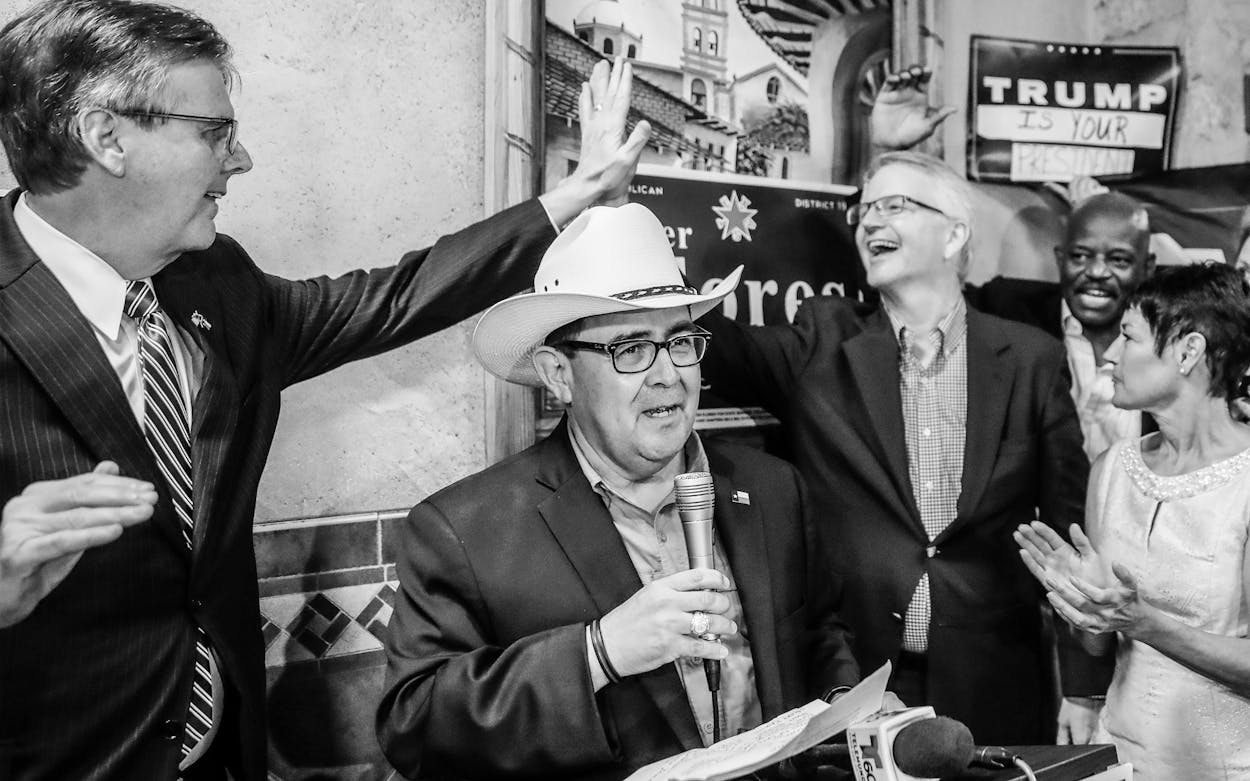The Texas Democratic Party ceased to exist as an effective political organization Tuesday as Republican Pete Flores defeated Democrat Pete Gallego in a special election runoff to replace convicted state Senator Carlos Uresti of San Antonio in Senate District 19. The upset gives Republican Lieutenant Governor Dan Patrick a lock on the state Senate, meaning he can push any piece of legislation he wants through the body, legislation like the bathroom bill that he forced a special session over last year. The loss also portends the likelihood that Republican Will Hurd will retain the 23rd Congressional District, making it one seat more difficult for Democrats nationally to take control of the U.S. House. And who do the Democrats blame for losing a senatorial district that Hillary Clinton won with 53 percent of the vote in 2016? Not themselves.
“Come November, no Democrat can sit on the sidelines and no campaign can take any vote for granted. We need to make sure that every voter understands what’s at stake,” state Democratic Chairman Gilberto Hinojosa said in a statement. “Governor Abbott stole an election, plain and simple. Republicans set a date that would guarantee low voter turnout, then Lt. Governor Dan Patrick and Republican special interests poured money into the race, denying the people of West Texas and the U.S. Mexico border representation that shares their values.”
Abbott “stole” the election? Governors set special elections for a date most favorable to their party. And Republicans poured money into the race? The biggest question this year has been: Where are the Democratic donors? At the end of June, Abbott had $28.9 million cash in the bank. The five leading Democrats for statewide executive offices, plus the Texas Democratic Party, had a combined total of $1.6 million in the bank.
Then look at the impact of this special election on the Congressional District 23 race between Republican incumbent Will Hurd and Democratic challenger Gina Ortiz Jones. Senate District 19 covers much of the same land mass as the congressional district. The New York Times and Sienna College recently tried to poll the congressional district. Out of 35,873 calls made, 495 people agreed to be surveyed. Hurd led 51 percent to Jones 43 percent.
This is significant because this district is one of three congressional districts in Texas held by a Republican but carried by Clinton in the presidential election. Hurd edged Gallego out in that race two years ago. Hurd outspent him $4.1 million to $2.1 million. At present, Hurd had $3 million in the bank at the end of June; Ortiz Jones, $2.2 million.
The loss of Uresti’s seat also was a major blow to Democrats because of the state Senate rules. If the entire 31-member Senate is present, at least 19 senators must cast a procedural vote to bring legislation up for debate. Because there were 20 Republicans last session, Patrick could move any bill he wanted through the Senate. In the Fort Worth area, there is a hot challenge to Republican Senator Konni Burton from a Democrat named Beverly Powell. If Powell won in November, the number of Republicans would have dropped to the bare minimum for Patrick to get his way. But now the Senate has 21 Republicans, and a Burton loss would not cost Patrick the supermajority he needs to control the Senate.
If you need any further proof that the Democratic Party is dead as a brand, consider the fact the party’s nominee for U.S. Senate—Beto O’Rourke—is running away from the party. He has mounted his own highly successful fundraising operation against incumbent Republican Ted Cruz. Time and again, however, O’Rourke has used rhetoric to distance position himself as something more than a Democrat.
One thing O’Rourke has proved in this election, is that Democrats who are willing to work hard and raise money, can run as viable candidates. A two-party state has a much healthier democracy. Yes, the Senate District 19 race began tainted because the incumbent Democrat was convicted of fraud and had to resign. But the Democrats should have carried this district in a special election, the kind of contest where organization and sweat-equity can pay off over money. But when the party fumbles a race that should have been easy, like Senate District 19, you have to wonder how long it is going to take for Texas to once again have a viable Democratic Party.
- More About:
- Politics & Policy
- Pete Gallego






